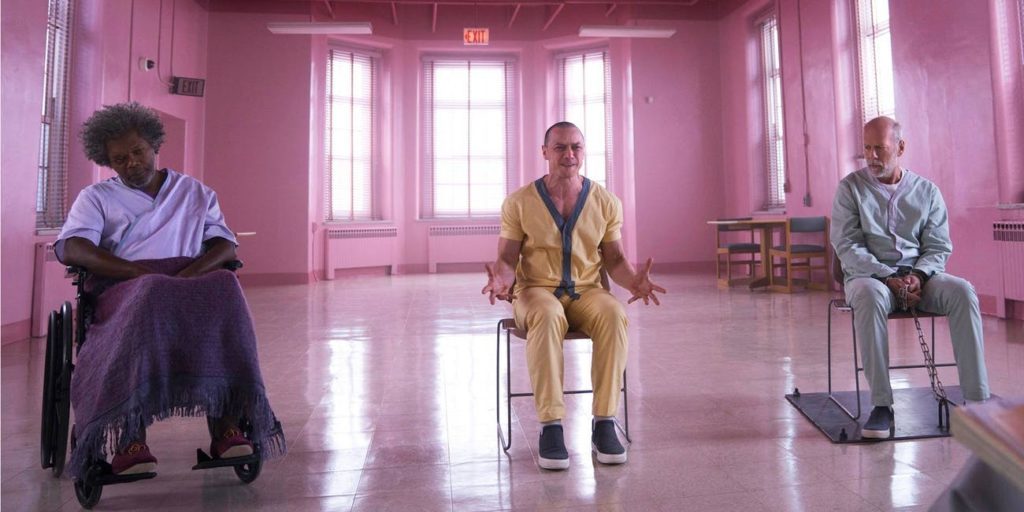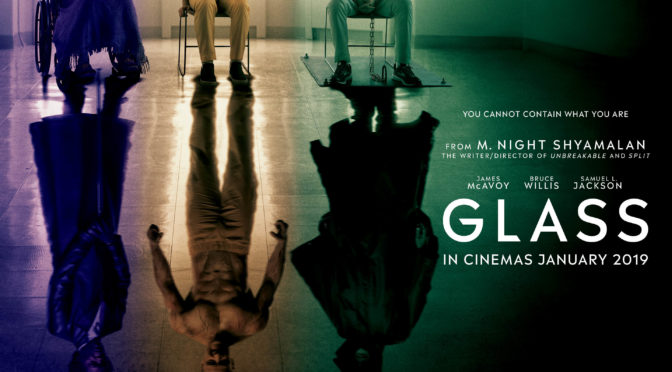After the surprise success of Split, Shyamalan’s follow up has become the much awaited sequel to this nearly 20 year film series. Having escaped capture, Kevin Wendell Crumb (James McAvoy; Atonement) continues kidnapping innocents until he and David Dunn (Bruce Willis), the main character from Unbreakable, find themselves caught and locked up in a mental institution with Dunn’s nemesis Mr. Glass (Samuel Jackson). They are placed under the supervision of a psychiatrist who claims they have delusions of grandeur, mistakenly believing themselves to be superheroes, and plans to cure them of this mental illness.
The leads are enjoying themselves reprising their roles. Willis, who has phoned in many of his performances, is fully invested in his weary, but committed Dunn who now runs a security store and patrols the city at night. McAvoy continues to embrace schizophrenic acting as he switches from playing a nine year old boy to a strict British woman and more. While sometimes resembling a comedian improvising new characters, the jarring personality changes are entertaining to watch. Jackson plays up his Mr. Glass as a cartoonishly evil villain that fits the film’s explicitly comic book tone. His erect hair and shimmering purple suit make him a cross between a mad scientist and the Joker with enough heinous acts onscreen to reinforce his threat, despite his physical appearance. The other returning cast member, Anya Taylor-Joy as Casey, plays a limited role and is pushed to secondary character status for the bulk of the runtime.

As with all of Shyamalan’s films, the focus eventually shifts to the plot twist. In the case of Glass there are multiple reveals late in the film. None of these is as impactful as the twist from The Sixth Sense or as unexpected as the larger universe connection in Split. At the same time, the twists are inoffensive. They reveal some information which breaks a central relationship, but nothing that recontextualizes the narrative so far. They serve as additional facts rather than major paradigm shifts.
There are also attempts to flesh out the greater film world that fall flat. Shyamalan tries to expand his mythos with secretive organizations and hints at expanded lore, but these attempts at world-building come too late to have any effect. As the third, and presumably final, film in the series, this effort is unnecessary and distracts from the central story.
The final question of Glass is whether it builds on Shyamalan’s recent resurgence to good favor or if it is a trip back to his string of bad features from the mid-2000s. The true answer is neither. The film is somewhere in between. The story isn’t thrilling or surprising, nor does it create emotional investment, but the acting is enjoyable and the craft is strong. Shyamalan reteams with cinematographer Mike Gioulakis who adopts a striking color palette. He uses soft hues of purple, yellow, and green to represent Glass, Crumb, and Dunn, respectively, that are rarely used together in film and give the title a distinct, contrasting aesthetic. It won’t live up to the hype generated by the surprise reveal in Split and falls far short of its potential, but Glass is harmless entertainment.

3/5 stars.
